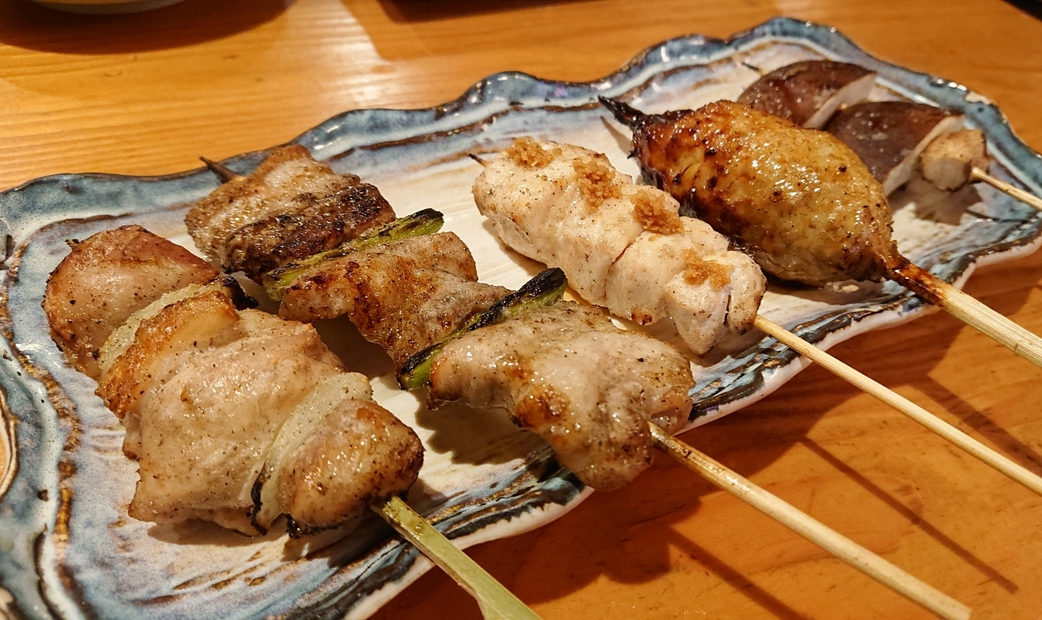
All About Yakitori: History, Types of Skewers, Recipes, and Restaurants
Yakitori has been a popular dish in Japan for a long time. The OMAKASE editorial team, an official Michelin partner, will introduce the history of yakitori, types of skewers, recipes, and recommended yakitori restaurants to visit when you come to Japan.
What is Yakitori?
Yakitori is one of Japan's most iconic skewered dishes. It consists of pieces of chicken, carefully skewered on bamboo sticks and grilled over charcoal. Despite its simplicity, yakitori offers a deep and rich flavor, with the option to enjoy different parts of the chicken. It is typically seasoned with tare (a sweet and savory sauce) or salt, and is widely loved in izakayas and specialty restaurants throughout Japan.
The History of Yakitori in Japan
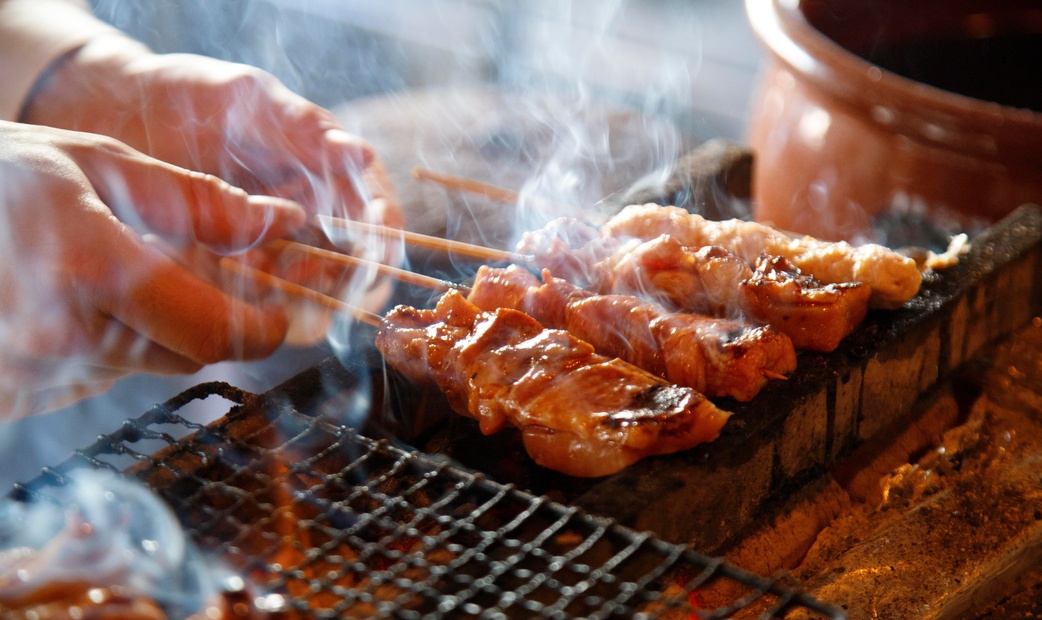.jpeg)
Yakitori has been a beloved dish in Japan for over 300 years. While chicken was once considered a luxury for common people, it was offered as a skewered dish at festivals and events. About 100 years ago, with the growth of the poultry industry, chicken became more readily available, leading to the development of Yakitori as a popular part of the culture. Yakitori food stalls appeared, and more shops started offering various parts of chicken, including organs and lesser cuts, as well as pork and beef offal. About 50 years ago, easy-to-raise chicken breeds became more common in Japan, solidifying Yakitori’s place as a common and popular dish in izakaya (Japanese pubs) and other restaurants. In the last 30 years, with a greater focus on food safety and quality, jidori (local regional chicken breeds), which were once difficult to source, began to be used. Now, Yakitori can be enjoyed in a wide range of settings from high-end restaurants to casual standing bars.
Yakitori can also refer to skewers made with ingredients other than chicken.
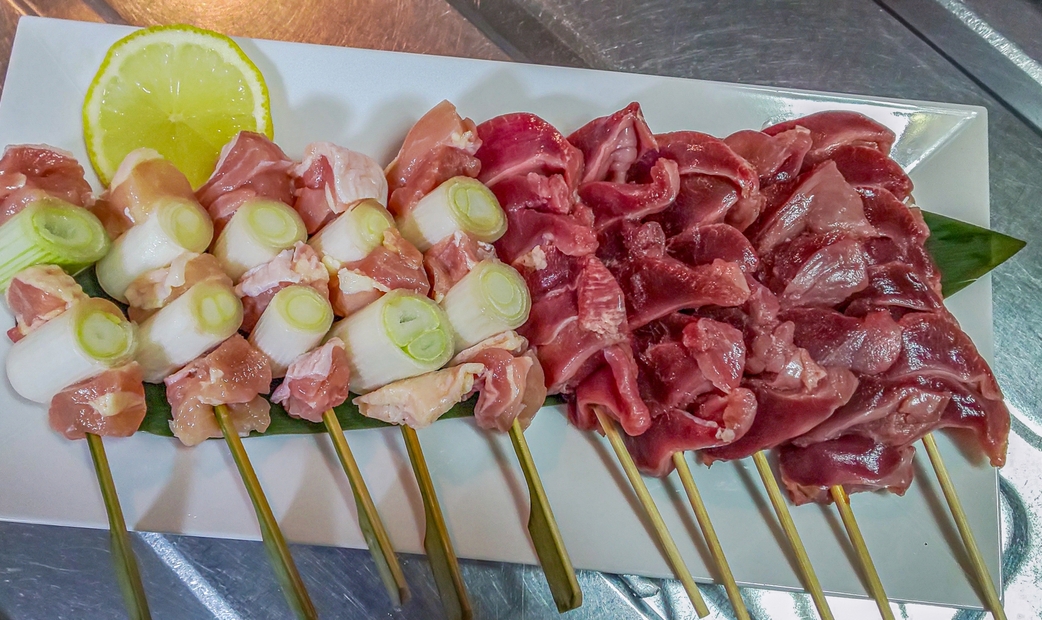
While chicken skewers are the most popular type of yakitori, other meats such as beef, pork, and even horse, as well as offal, are sometimes used for skewers as well.
The Japan Yakitori Association recognizes yakitori based on the following three criteria:
- It uses meat or offal from livestock such as chicken, beef, or pork.
- The ingredients are cut into manageable sizes and skewered.
- The skewers are seasoned with salt or tare (a sweet-savory sauce) and grilled.
Popular Types of Yakitori
Negima (chicken and Japanese leek)
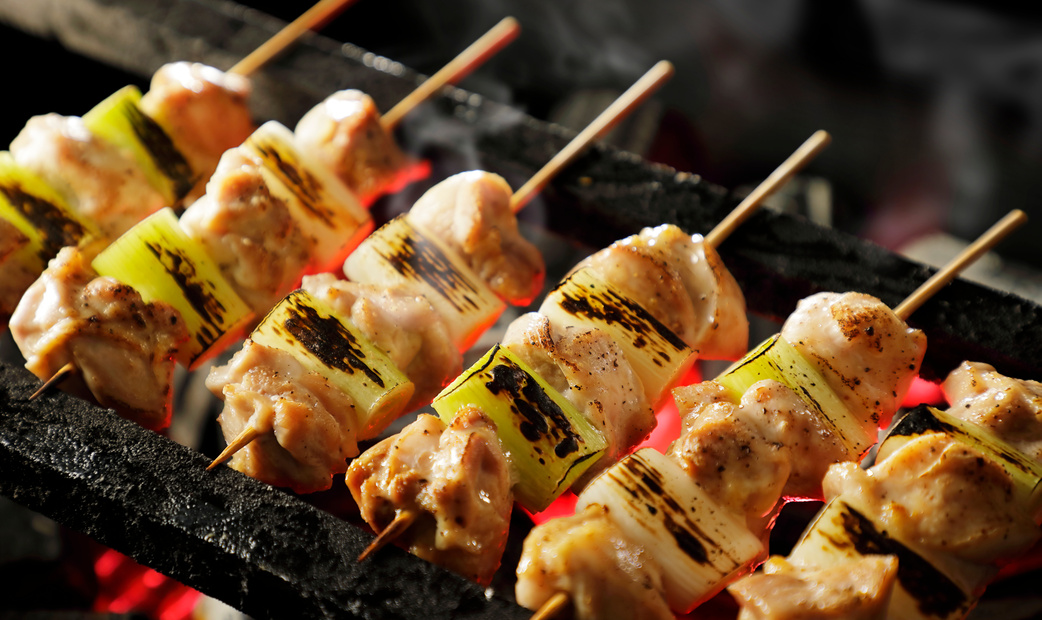
A classic skewer alternating between chicken thigh and Naganegi (Japanese leek).
Tsukune (chicken meatball)
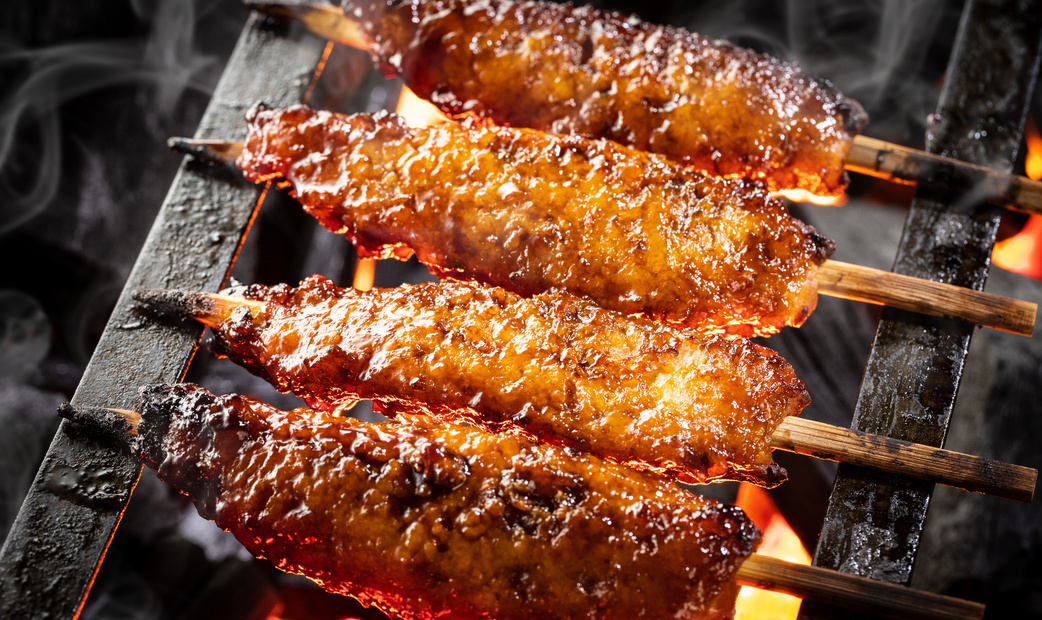
A skewer of ground chicken shaped into meatball-like balls.
Kawa (chicken skin)
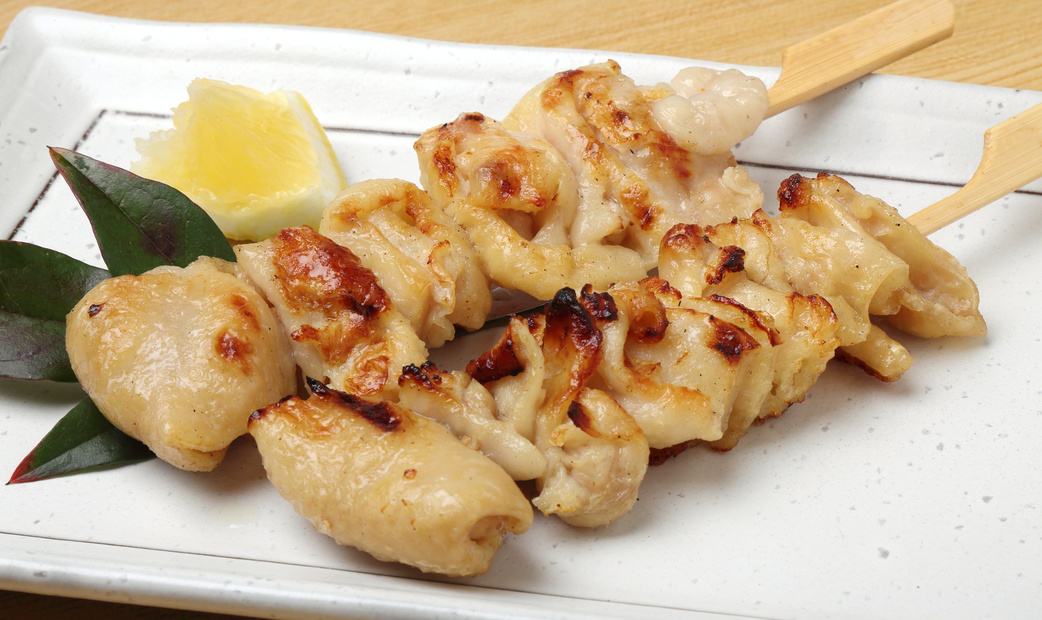
Crispy grilled chicken skin.
Reba (liver)
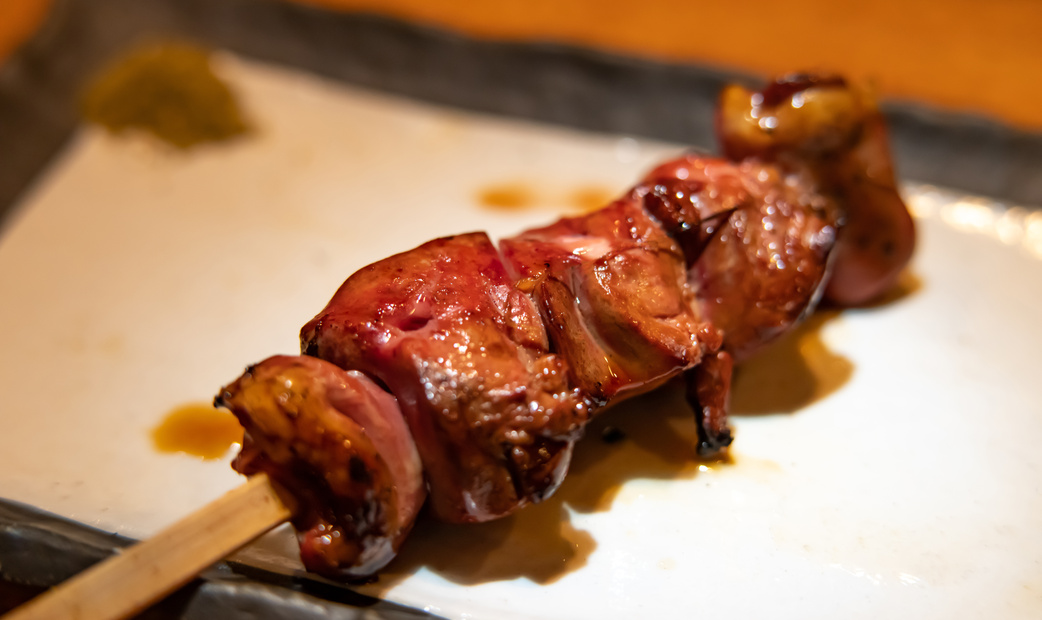
Chicken liver, known for its rich and intense flavor.
Sunagimo (chicken gizzard)
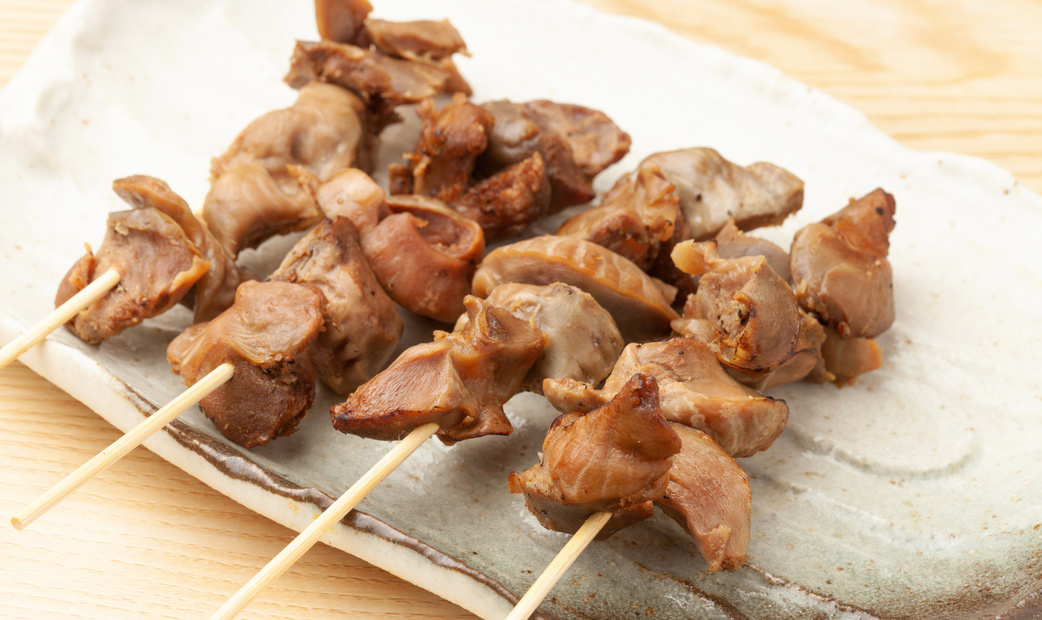
Chicken gizzard, known for its chewy and crunchy texture.
Tebasaki (chicken wings)
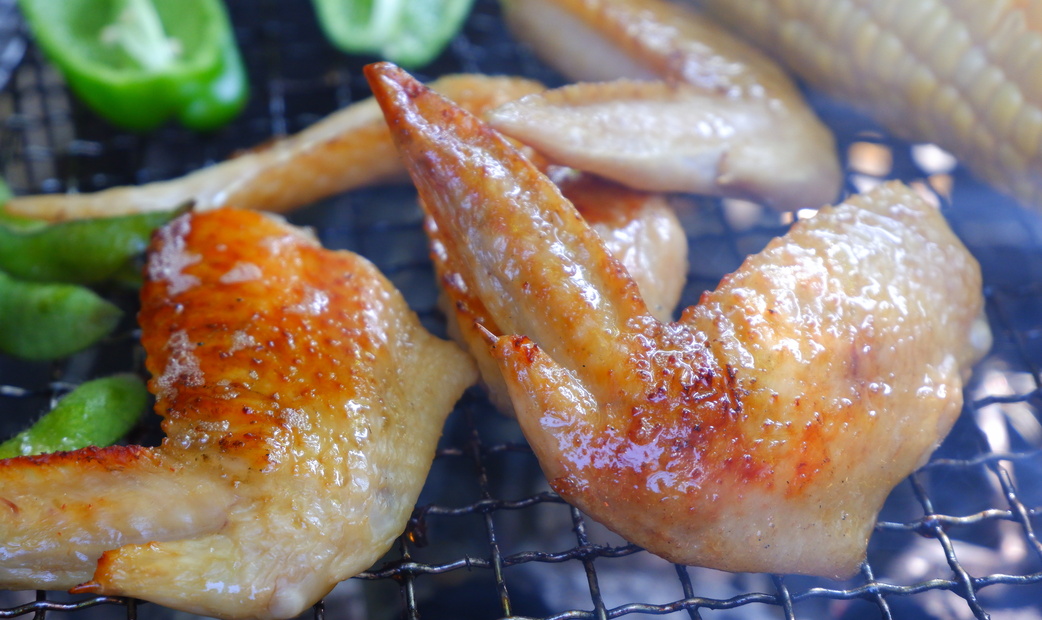
Chicken wings, juicy and satisfying with a hearty bite.
Introduction to Skewers Made with Meats Other Than Chicken
Butabara gushi (pork belly skewer)
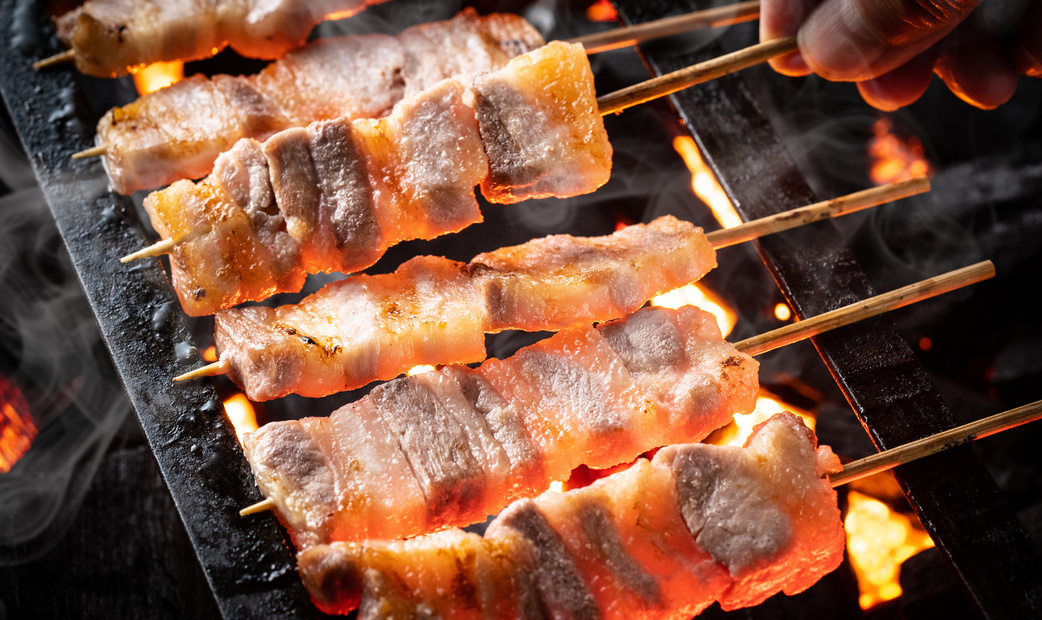
A skewer of vegetables wrapped in pork belly and grilled.
Shiitake gushi (shiitake mushroom skewer)
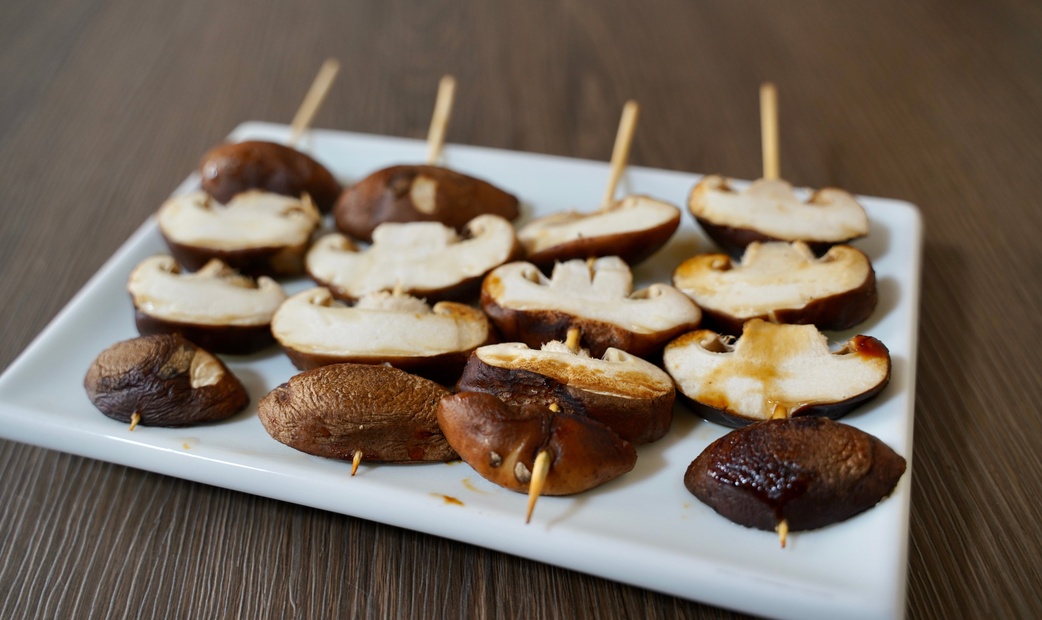
A dish of shiitake mushrooms grilled with butter and soy sauce.
Uzura tamago gushi (quail egg skewer)
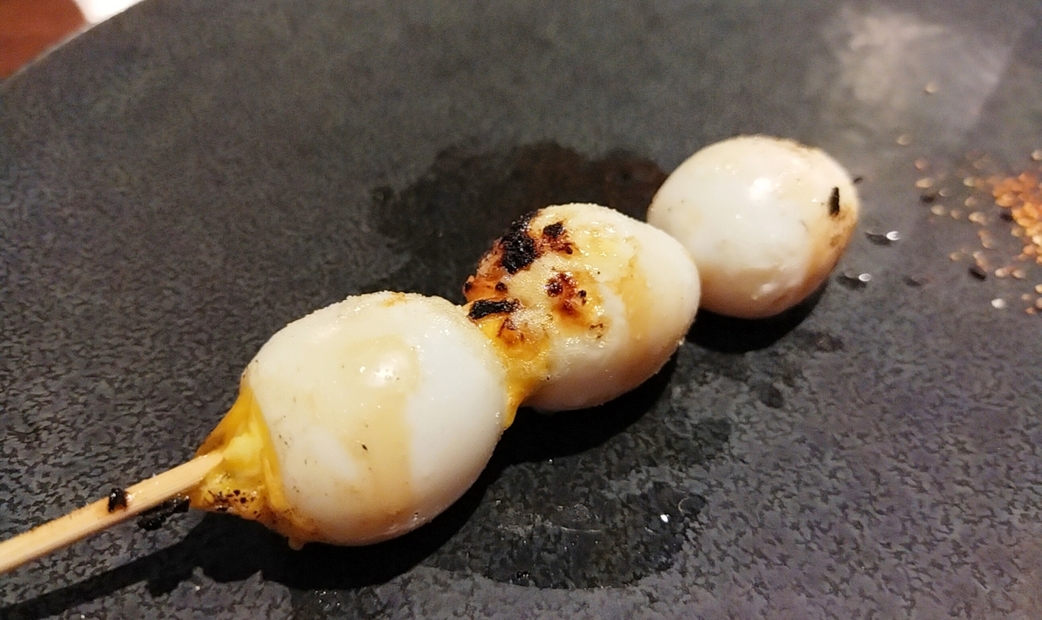
Skewered and grilled boiled quail eggs.
How to Make Yakitori at Home
You can also enjoy Yakitori at home. It’s easy to make with the following steps.
Preparing the Ingredients
- Chicken (thighs, breasts, chicken tenders, etc.)
- Japanese leek, green peppers, shishito peppers, etc. (optional, based on preference)
- Bamboo skewers
- Sake, sugar, mirin, soy sauce (for making the tare)
Preparation Steps
Cut the chicken into bite-sized pieces and skewer them onto the bamboo sticks.
For a better presentation, alternate the vegetables between the pieces of chicken.
Seasoning
- For tare: Mix soy sauce, mirin, sugar, and sake, then simmer until thickened.
- For salt: Lightly sprinkle salt just before grilling.
How to grill
- Grill or cook over medium to low heat, cooking slowly.
- Brush with sauce while grilling to achieve a nice, savory finish.
If the ingredients are unavailable:
You can find soy sauce, mirin, and bamboo skewers at supermarkets that carry Japanese food products, such as Mitsuwa and H Mart in the United States, or Korean markets in Korea. If they are not available at your local supermarket, you can also purchase them online.
Tips for skewering chicken
Place the chicken pieces straight on a flat cutting board while sitting.
Skewering is easier with a lower line of sight.
Skewer the chicken so the height and width are even, piercing it completely parallel to the work surface.
Evenly sized chicken cooks evenly and gets nice browning.
When eating Yakitori at a restaurant in Japan
Price per skewer
In casual restaurants, the price of Yakitori typically ranges from 100 to 300 yen per skewer. The price may vary depending on the type of meat and the restaurant.
A platter with a variety of different types of yakitori to enjoy.
If it's your first time visiting, we recommend the platter. You can enjoy a variety of cuts, and the price is reasonable.
With tare or salt
You can choose between tare or salt when ordering.
Salt is recommended if you want to enjoy the natural flavor of the ingredients.
Many restaurants will recommend their preferred seasoning.
Where to Enjoy Yakitori
Casual Yakitori Restaurants
Under the railway bridge in Yurakucho and Shimbashi, you'll find a variety of casual Yakitori restaurants with a nostalgic atmosphere. Many of these places have a standing bar style, where after-work businessmen gather. You can enjoy Yakitori at affordable prices while experiencing the lively scene.
Yakitori chain restaurants
For those who want to casually enjoy Yakitori, chain restaurants are a great option. They offer a wide variety at reasonable prices. "Torikizoku" is the most famous of these establishments.
High-end restaurants
Yakitori can also be enjoyed at high-end restaurants. Each skewer, grilled by top artisans over charcoal, is like a work of art. Omakase (chef's choice) courses are common, and you can also enjoy pairing them with wine or sake.
Recommended Fine Dining Yakitori Restaurants in Tokyo
Not only casual Yakitori restaurants and izakayas, but also fine dining establishments where top chefs prepare premium brand chickens from all over Japan are very popular. In this article, we will introduce several highly-rated Tokyo restaurants featured in the Michelin Guide, where you can enjoy an Omakase course. Many fine dining restaurants in Japan require reservations in advance, so be sure to make a reservation through their website before your visit to Japan.
1. Yakitori Takahashi (焼鳥 髙はし) / Nihonbashi
Yakitori Takahashi, which earned its first Michelin star in the 2025 Michelin Guide, is a Yakitori restaurant located in Nihonbashi, near Ginza. The owner, who trained at renowned establishments such as "Torishiki" and "Torikado", prepares skewers with carefully selected meats and ingredients, grilling them with precision. The 'Negima' (chicken and Japanese leek skewers) and 'Tsukune' (chicken meatballs) are particularly exceptional. The restaurant features a calm atmosphere with L-shaped counter seating, allowing guests to enjoy their meal while watching the craftsmanship of the chef.
- Operation hours
- 5:00PM~10:30PM (Last entry time 8:00PM)
- Regular holiday
- Thursdays, Sundays
- Price range
- Dinner: USD 84.59 - USD 84.59
- Address
- Ordin Nihonbashi Building 2F, 2-10-11, Nihonbashi, Chuo-ku, Tokyo
- Nearest station
- Nihonbashi Station
- Directions from station
- 1 minute walk from Exit B4 or C4 of Nihonbashi Station
- Payment methods
- Cash, Credit card
- Total Seats
- 10 Seats
- Awards
-
MichelinAwards
-
Steven Sell5.0Posted on :01/02/2026
-
Natassa5.0Posted on :12/20/2025
-
KK5.0Posted on :10/25/2025
2. Yakitori Abe (やきとり 阿部) / Jiyugaoka
Yakitori Abe is a Yakitori restaurant in Jiyugaoka that has earned the Bib Gourmand distinction in the Michelin Guide for consecutive years. The restaurant focuses on pairing Yakitori with wine, offering exquisite skewers of free-range chicken and seasonal vegetables, all grilled over charcoal. Meals are served in an Omakase style, with dishes coming continuously until the customer says "stop". In addition to Yakitori, the menu features a variety of side dishes such as Toriwasa (chicken sashimi) and potato salad, as well as main dishes like grilled rice balls and Inaniwa udon noodles.
- Operation hours
- 5:00 PM - 7:50 PM (Last Order 7:20 PM)
8:00 PM - 11:00 PM (Last Order 10:00 PM) - Regular holiday
- Sundays, Mondays
- Price range
- Dinner: USD 84.59 - USD 84.59
- Address
- 1F. Miyuki House, 3-3-4, Kami-Osaki 3-chome, Shinagawa-ku, Tokyo
- Nearest station
- Meguro Station
- Directions from station
- 4 minutes walk from Meguro station
- Payment methods
- Cash, Credit card
- Total Seats
- 13 Seats
- Awards
-
Michelin
 Awards
Awards
-
Jason Brown4.7Posted on :02/12/2026
-
Jasper5.0Posted on :03/13/2025
-
Cheng5.0Posted on :10/26/2024
3. Omino Kamiyacho (おみ乃 神谷町) / Kamiyacho
This restaurant is a branch of "Omino", which has earned a Michelin star. The chef carefully selects premium chicken from various renowned brands across Japan, using the best available options at any given time. The restaurant also uses a mix of several types of binchotan charcoal, adjusting the heat to suit the chicken and the specific cuts being grilled. The menu is available only as an omakase course, and in between the Yakitori, a variety of other dishes are served, allowing guests to enjoy the entire experience.
- Operation hours
- Lunch: 11:30‐ ※Wed,Sat
Dinner: 16:30- - Regular holiday
- Sundays, Public Holidays, Irregular Holidays
- Price range
-
Lunch: USD 74.01 - USD 84.59
Dinner: USD 74.01 - USD 84.59 - Address
- 1F, Seiryu Building, 1-38-4, Oshiage, Sumida-ku, Tokyo
- Nearest station
- Oshiage Station
- Directions from station
- 3 minutes walk from Oshiage Station
- Payment methods
- Cashless payment (credit card, electronic money, and some QR codes) only
*Cash, Alipay, UnionPay (UnionPay), etc. are not accepted. Please note that cash, Alipay, UnionPay (UnionPay), etc. are not accepted.
【Supported payment methods】
Various credit cards,Transportation IC,Apple Pay,iD,QUICPay. - Total Seats
- 17 Seats
- Awards
-
Michelin
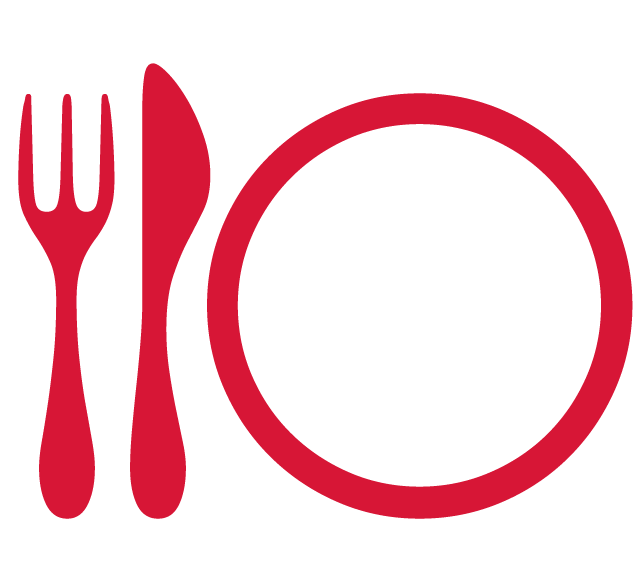 Awards
Awards


.jpg)